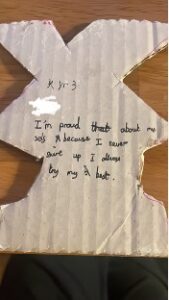As summer days begin to wane, many of us have been looking towards the resumption of familiar patterns; school, work, bigger responsibilities. It seems like only a few weeks ago that schools were closing their doors for summer, Parliament had entered recess, and families were beginning to fall into the rhythm of holidays, childcare, or just catching a much-needed breath; a collective moment of transition that always seems to signify an exhale, a pause to reflect, to celebrate, and to quietly ask, what’s next?
Let the past be your root, not your anchor
After years shaped by the pandemic, with all its sudden changes, deep losses, and quiet resilience, transitions can feel heavier and ask more of us. Whether it’s the end of a school year, a change in job, or simply growing into the next version of us, these turning points invite more than just logistical planning. They call for attention. For recognition. For care. Because every ending is also a beginning a softer, wiser, more courageous one, if we let it be.
For some, summer has meant sunshine and slowing down. For many others, especially parents and carers, it has meant the continued juggle of work, childcare, and managing life’s relentless to do list. The logistics behind the scenes never pause; early logins, shift swaps, pick-ups coordinated through group chats and favours. This invisible labour is so often overlooked. And yet it’s here, in the thick of it, that communities can step in. Not always through grand gestures, but in small, meaningful ways: sharing meals, swapping childcare, checking in, celebrating little milestones.
When you outgrow a season, don’t shrink to stay
This summer, I took a bit of leave to volunteer at Oxfordshire’s largest primary school, a place that has held a big piece of my heart for some time. I’ve worked with this school before, offering creative support for students who need extra help with communication, regulation, or just being understood.
It’s in the noticing that we help each other grow. Returning this time was like coming home. I saw again the incredible, often unrecognised work of teachers, teaching assistants, SEND professionals, and pastoral staff. By creating room for joy in the margins of a packed curriculum they help children carry big feelings and brave new beginnings. They transition with them—not just academically, but emotionally. They don’t just teach. They hold. They guide. And they notice, and that’s the heart of it: noticing. That quiet superpower. It’s in the noticing that we help each other grow, and whilst I was there I ran two transition sessions for Year 2 and Year 3 students.
What are you proud of and what do you hope for?
We began the sessions by asking the adults in the room (the teacher and support) these two simple questions, with the intention of role modelling the answers for the children.
The school’s logo is a windmill, and that felt powerful poetic, even. Windmills represent energy, movement, transformation. They don’t resist the wind; they harness it. And that’s exactly what these children were doing: standing on the edge of change, turning their thoughts and feelings like sails in the breeze.Without hesitation, and armed with cardboard windmills, paint, crayons, and a beautiful mess of art supplies, the children poured their hearts out. Some spoke about learning to read or making new friends. Others shared that they’d found courage when things felt hard.

And when we talked about the year ahead there was hope for more adventures on the playground, for kindness, for doing their best.

It reminded me that transitions aren’t just logistics, they’re stories. They’re the turning of a page, the space where we begin again, carrying every chapter before with us.
There’s beauty in these in-between spaces
We are still healing from global crises, from personal ones, from change we didn’t choose. In the pause between what was and what’s next, we can ground ourselves in care and community. Like windmills, we don’t have to resist change, we can turn with it. And in turning together, we generate something powerful: energy, resilience, and hope.
Stretch into the future with grace
So how do we, as community members, show up for one another during transitions? There are small, powerful things we can do.
Name the change
Say “That was a big year,” or “This might feel different, how are you doing?”
Celebrate the wins
Bake the cake. Frame the art. Send the text. Rituals don’t have to be elaborate, just intentional.
Volunteer when you can
One hour at a school or youth centre can ripple out further than you think.
Make space for hope
Ask what’s next.
What do you dream about?
What are you excited for?
George O’Shaughnessy is an experienced community builder with over a decade of hands-on experience fostering inclusive environments and empowering individuals.
What he’s proud of; how we’ve all pulled together, shared ideas, and actually made things happen for the early years.
What he hopes for; that we keep that energy going and keep finding new ways to work together so every child gets the best start.
